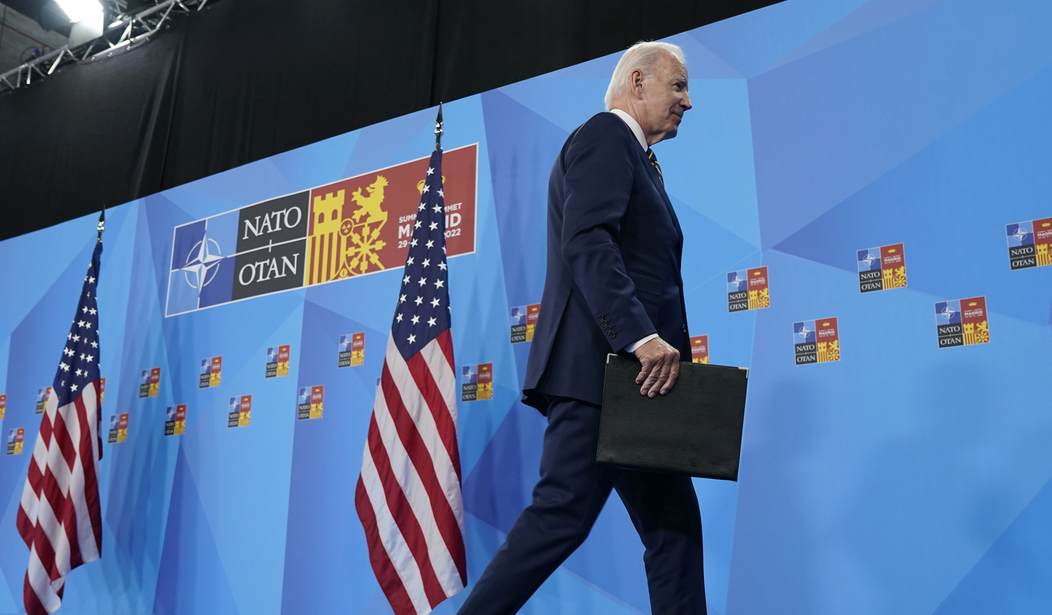Beijing's and Moscow's lawlessness and collaborative belligerence threaten all sovereign nations in Europe and Asia.
We still have time to respond with a war-deterring diplomatic stroke: extending NATO's Article 5 to committed nations in the Pacific and East Asia who already field NATO-ready military forces.
Background: The NATO treaty's Article 5 exemplified the hard, clear-eyed diplomacy that won the Cold War. Cheekily known as the Three Musketeers Clause, Article 5 told the Soviet Union "that an armed attack against one or more of them (NATO members) ... shall be considered an attack against them all."
Each member would then take "action as it deems necessary, including the use of armed force, to restore and maintain" NATO security. The enemy had to attack a member's territory or member "forces, vessels or aircraft" operating "in or over" NATO territory.
Moscow and Beijing: Neo-Fascist Russia and Communist China are demonstrably lawless. Russia signed the 1994 Budapest Accords and guaranteed Ukraine's territorial integrity in exchange for its nuclear weapons. In 2014 Vladimir Putin's Russia invaded and annexed Crimea.
China signed the U.N. Convention on the Law of the Sea (UNCLOS) treaty. Ignoring the treaty, China construction barges and fishing boats invaded the Philippines. The barges built artificial islands with jet air bases; the fishing fleet poached Filipino reefs. As the invasion progressed, Beijing claimed Filipino seas as Chinese territory.
In 2016 a U.N. court backed Manila's accusations of robbery and invasion. Beijing still ignores the verdict.
China also broke the Sino-British Treaty and crushed Hong Kong.
Chinese-Russian collaboration is multifaceted but these germane diplomatic and military cases make the big points. China supports Russia's invasion of Ukraine. Russian and Chinese diplomats collaborate as they seek to create and exploit political rifts among targeted nations worldwide. In the Pacific, the Russian and Chinese navies, air and missile forces stage mock attacks against Japanese and American air bases and naval targets, from Hawaii to Tokyo Bay.
Recommended
Does China encourage North Korea to threaten missile strikes on Guam and Hawaii?
That's a question with nuclear and NATO-less implications.
The U.S. is a founding NATO member. However, Guam and Hawaii are not covered by the NATO treaty and Article 5. The original 1949 treaty covered Europe and North America north of the Tropic of Cancer. Puerto Rico, Guam and Hawaii were outside the geographic zone.
When Turkey joined NATO in 1951 the treaty was amended and Article 5's reach extended. About 97% of Turkey is in Asia -- Anatolian Turkey.
2022's serendipity: Article 5 already covers a slice of Asia.
Expanding NATO and extending Article 5's geographic reach in order to deter war isn't a new idea. Though discussed for years, likely Asian members -- think Japan -- have favored strengthening deterrence using existing security arrangements, such as the bilateral and trilateral relationships that connect the U.S., Japan, Australia and Singapore.
Lawlessness and invasion, however, alter the calculus. In early June Japan's Nikkei.com featured a story with this quote from Sen. Ben Sasse, R-Neb.: "Let's build a NATO for the Pacific. We need allies to get back on the offensive against the CCP (Chinese Communist Party) ... as Chairman Xi (Jinping) looks to expand his sphere of influence, we need a new military alliance centered far out into the Pacific."
At the end of June leaders from Japan, South Korea, Australia and New Zealand attended NATO's Madrid summit.
On July 3 Turkish journalist and foreign policy analyst Mehmet Kanci wrote (at aa.com.tr) that the Asia-Pacific four's attendance "confirmed that the alliance will go beyond its Transatlantic identity and wave a flag in the Trans-Pacific geography by 2023." Kanci noted NATO's new strategic concept document calls China a common threat. China's "malicious" hybrid operations and rhetoric (e.g., "Wolf Warrior" diplomacy) "harm the security of the alliance..." Kanci concludes NATO's "paradigm shift" has begun.
Let's speed up the shift and put the Pacific's P in NATO. North Atlantic and Trans-Pacific Treaty Organization. If NAPTO seems awkward, APTO is apt.

























Join the conversation as a VIP Member